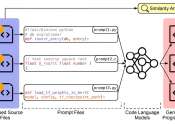Facebook is using AI to stem dangerous and false posts
Facebook has come under withering criticism this past year from folks who say the company is not doing enough to stem hate speech, online harassment and the spread of false news stories.
Internet

Facebook has come under withering criticism this past year from folks who say the company is not doing enough to stem hate speech, online harassment and the spread of false news stories.
Consumer & Gadgets

There was a time when the family washing machine would last decades, with each breakdown fixed by the friendly local repair person. But those days are long gone.
Oct 26, 2023
0
2
Computer Sciences

The recent explosion of artificial intelligence tools such as ChatGPT and Copilot have supercharged the assistance available to programmers. However, AI assistants may strip out comments embedded in code to convey copyright ...
Jul 31, 2023
0
57
Internet

YouTube has amended a form used to resolve copyright disputes after the operators of a German web channel received death threats.
Nov 7, 2014
0
0
Business

US music publishers representing artists such as Ariana Grande, Imagine Dragons and the Rolling Stones said Thursday they are suing hit video game Roblox for allegedly using songs without permission.
Jun 11, 2021
0
4
Business

A federal judge Tuesday dismissed Apple's copyright infringement lawsuit against cybersecurity startup Corellium in a case which could have implications for researchers who find software bugs and vulnerabilities.
Dec 30, 2020
0
10
Machine learning & AI

Universal and other music publishers have sued artificial intelligence company Anthropic in a US court for using copyrighted lyrics to train its AI systems and in generating answers to user queries.
Oct 20, 2023
0
7
Internet

Four major publishing houses Monday sued the Internet Archive alleging that its "national emergency library" allowing locked-down readers free access to digital books was "brazenly" violating copyright laws.
Jun 1, 2020
0
50
Internet

US lawmakers seeking to rein in Big Tech have been stepping up efforts to limit legal immunity for online services, and now are taking that fight global.
Dec 8, 2019
0
7
Business

Thousands of Australian books have been found on a pirated dataset of ebooks, known as Books3, used to train generative AI. Richard Flanagan, Helen Garner, Tim Winton and Tim Flannery are among the leading local authors affected—along, ...
Sep 29, 2023
0
1
Copyright infringement (or copyright violation) is the unauthorized use of material that is covered by copyright law, in a manner that violates one of the copyright owner's exclusive rights, such as the right to reproduce or perform the copyrighted work, or to make derivative works.
For electronic and audio-visual media, unauthorized reproduction and distribution is occasionally referred to as piracy (an early reference was made by Daniel Defoe in 1703 when he said of his novel True-born Englishman : "Its being Printed again and again, by Pyrates"). The practice of labeling the act of infringement as "piracy" actually predates copyright itself. Even prior to the 1709 enactment of the Statute of Anne, generally recognized as the first copyright law, the Stationers' Company of London in 1557 received a Royal Charter giving the company a monopoly on publication and tasking it with enforcing the charter. Those who violated the charter were labeled pirates as early as 1603.
The legal basis for this usage dates from the same era, and has been consistently applied until the present time. Critics of the use of the term "piracy" to describe such practices contend that it is pejorative, unfairly equates copyright infringement with more sinister activity, though courts often hold that under law the two terms are interchangeable.
This text uses material from Wikipedia, licensed under CC BY-SA